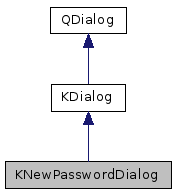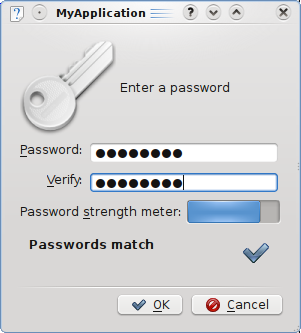KDEUI
#include <knewpassworddialog.h>

Signals | |
| void | newPassword (const QString &password) |
 Signals inherited from KDialog Signals inherited from KDialog | |
| void | aboutToShowDetails () |
| void | applyClicked () |
| void | buttonClicked (KDialog::ButtonCode button) |
| void | cancelClicked () |
| void | closeClicked () |
| void | defaultClicked () |
| void | finished () |
| void | helpClicked () |
| void | hidden () |
| void | layoutHintChanged () |
| void | noClicked () |
| void | okClicked () |
| void | resetClicked () |
| void | tryClicked () |
| void | user1Clicked () |
| void | user2Clicked () |
| void | user3Clicked () |
| void | yesClicked () |
Protected Member Functions | |
| bool | checkAndGetPassword (QString *pwd) |
| virtual bool | checkPassword (const QString &) |
 Protected Member Functions inherited from KDialog Protected Member Functions inherited from KDialog | |
| KDialog (KDialogPrivate &dd, QWidget *parent, Qt::WindowFlags flags=0) | |
| virtual void | closeEvent (QCloseEvent *e) |
| virtual void | hideEvent (QHideEvent *) |
| virtual void | keyPressEvent (QKeyEvent *) |
Additional Inherited Members | |
 Public Types inherited from KDialog Public Types inherited from KDialog | |
| enum | ButtonCode { None = 0x00000000, Help = 0x00000001, Default = 0x00000002, Ok = 0x00000004, Apply = 0x00000008, Try = 0x00000010, Cancel = 0x00000020, Close = 0x00000040, No = 0x00000080, Yes = 0x00000100, Reset = 0x00000200, Details = 0x00000400, User1 = 0x00001000, User2 = 0x00002000, User3 = 0x00004000, NoDefault = 0x00008000 } |
| enum | ButtonPopupMode { InstantPopup = 0, DelayedPopup = 1 } |
| enum | CaptionFlag { NoCaptionFlags = 0, AppNameCaption = 1, ModifiedCaption = 2, HIGCompliantCaption = AppNameCaption } |
 Public Slots inherited from KDialog Public Slots inherited from KDialog | |
| void | delayedDestruct () |
| void | enableButton (ButtonCode id, bool state) |
| void | enableButtonApply (bool state) |
| void | enableButtonCancel (bool state) |
| void | enableButtonOk (bool state) |
| void | enableLinkedHelp (bool state) |
| bool | isDetailsWidgetVisible () const |
| virtual void | setCaption (const QString &caption) |
| virtual void | setCaption (const QString &caption, bool modified) |
| void | setDetailsWidget (QWidget *detailsWidget) |
| void | setDetailsWidgetVisible (bool visible) |
| void | setHelp (const QString &anchor, const QString &appname=QString()) |
| void | setHelpLinkText (const QString &text) |
| virtual void | setPlainCaption (const QString &caption) |
 Static Public Member Functions inherited from KDialog Static Public Member Functions inherited from KDialog | |
| static bool | avoidArea (QWidget *widget, const QRect &area, int screen=-1) |
| static void | centerOnScreen (QWidget *widget, int screen=-1) |
| static int | groupSpacingHint () |
| static QString | makeStandardCaption (const QString &userCaption, QWidget *window=0, CaptionFlags flags=HIGCompliantCaption) |
| static int | marginHint () |
| static void | resizeLayout (QWidget *widget, int margin, int spacing) |
| static void | resizeLayout (QLayout *lay, int margin, int spacing) |
| static void | setAllowEmbeddingInGraphicsView (bool allowEmbedding) |
| static int | spacingHint () |
 Protected Slots inherited from KDialog Protected Slots inherited from KDialog | |
| virtual void | slotButtonClicked (int button) |
| void | updateGeometry () |
 Protected Attributes inherited from KDialog Protected Attributes inherited from KDialog | |
| KDialogPrivate *const | d_ptr |
Detailed Description
A password input dialog.
This dialog asks the user to enter a new password.
The password has to be entered twice to check if the passwords match. A hint about the strength of the entered password is also shown.
Usage Example
Asynchronous
Synchronous

Definition at line 68 of file knewpassworddialog.h.
Constructor & Destructor Documentation
|
explicit |
Constructs a password dialog.
- Parameters
-
parent Passed to lower level constructor.
Definition at line 194 of file knewpassworddialog.cpp.
|
virtual |
Destructs the password dialog.
Definition at line 201 of file knewpassworddialog.cpp.
Member Function Documentation
|
virtual |
Definition at line 264 of file knewpassworddialog.cpp.
| bool KNewPasswordDialog::allowEmptyPasswords | ( | ) | const |
Allow empty passwords?
- Returns
- true if minimumPasswordLength() == 0
Definition at line 283 of file knewpassworddialog.cpp.
Checks input password.
If the password is right, returns true and fills pwd with the password. Otherwise returns false and pwd will be null.
- Since
- 4.2
Definition at line 231 of file knewpassworddialog.cpp.
Virtual function that can be overridden to provide password checking in derived classes.
It should return true if the password is valid, false otherwise.
Definition at line 353 of file knewpassworddialog.cpp.
| int KNewPasswordDialog::maximumPasswordLength | ( | ) | const |
Maximum acceptable password length.
Definition at line 305 of file knewpassworddialog.cpp.
| int KNewPasswordDialog::minimumPasswordLength | ( | ) | const |
Minimum acceptable password length.
Definition at line 294 of file knewpassworddialog.cpp.
|
signal |
The dialog has been accepted, and the new password is password.
| QString KNewPasswordDialog::password | ( | ) | const |
Returns the password entered.
- Note
- Only has meaningful data after accept has been called if you want to access the password from a subclass use checkAndGetPassword()
Definition at line 348 of file knewpassworddialog.cpp.
| int KNewPasswordDialog::passwordStrengthWarningLevel | ( | ) | const |
Password strength level below which a warning is given.
Definition at line 343 of file knewpassworddialog.cpp.
| QPixmap KNewPasswordDialog::pixmap | ( | ) | const |
Returns the pixmap that appears next to the prompt in the dialog.
Definition at line 226 of file knewpassworddialog.cpp.
| QString KNewPasswordDialog::prompt | ( | ) | const |
Returns the password prompt.
Definition at line 213 of file knewpassworddialog.cpp.
| int KNewPasswordDialog::reasonablePasswordLength | ( | ) | const |
Password length that is expected to be reasonably safe.
Definition at line 326 of file knewpassworddialog.cpp.
| void KNewPasswordDialog::setAllowEmptyPasswords | ( | bool | allowed | ) |
Allow empty passwords? - Default: true.
same as setMinimumPasswordLength( allowed ? 0 : 1 )
Definition at line 276 of file knewpassworddialog.cpp.
| void KNewPasswordDialog::setMaximumPasswordLength | ( | int | maxLength | ) |
Maximum acceptable password length.
- Parameters
-
maxLength The new maximum password length.
Definition at line 299 of file knewpassworddialog.cpp.
| void KNewPasswordDialog::setMinimumPasswordLength | ( | int | minLength | ) |
Minimum acceptable password length.
Default: 0
- Parameters
-
minLength The new minimum password length
Definition at line 288 of file knewpassworddialog.cpp.
| void KNewPasswordDialog::setPasswordStrengthWarningLevel | ( | int | warningLevel | ) |
Set the password strength level below which a warning is given Value is in the range 0 to 99.
Empty passwords score 0; non-empty passwords score up to 100, depending on their length and whether they contain numbers, mixed case letters and punctuation.
Default: 1 - warn if the password has no discernable strength whatsoever
- Parameters
-
warningLevel The level below which a warning should be given.
Definition at line 332 of file knewpassworddialog.cpp.
| void KNewPasswordDialog::setPixmap | ( | const QPixmap & | pixmap | ) |
Sets the pixmap that appears next to the prompt in the dialog.
The default pixmap represent a simple key.
the recommended size is KIconLoader::SizeHuge
Definition at line 219 of file knewpassworddialog.cpp.
| void KNewPasswordDialog::setPrompt | ( | const QString & | prompt | ) |
Sets the password prompt.
Definition at line 207 of file knewpassworddialog.cpp.
| void KNewPasswordDialog::setReasonablePasswordLength | ( | int | reasonableLength | ) |
Password length that is expected to be reasonably safe.
Used to compute the strength level
Default: 8 - the standard UNIX password length
- Parameters
-
reasonableLength The new reasonable password length.
Definition at line 312 of file knewpassworddialog.cpp.
The documentation for this class was generated from the following files:
Documentation copyright © 1996-2014 The KDE developers.
Generated on Tue Oct 14 2014 22:49:17 by doxygen 1.8.7 written by Dimitri van Heesch, © 1997-2006
KDE's Doxygen guidelines are available online.
 KDE API Reference
KDE API Reference